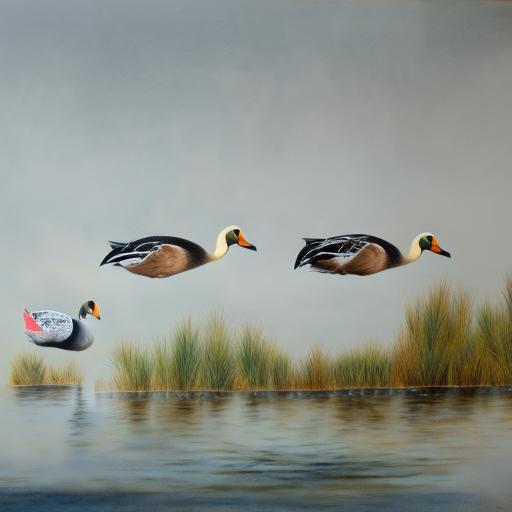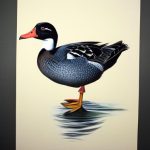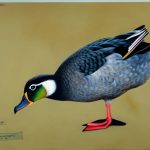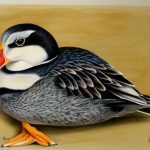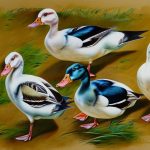Black ducks are a popular breed of domestic ducks known for their striking black plumage and unique characteristics. They are often kept for their ornamental value, as well as for their meat and eggs. Black ducks come in various breeds, each with its own distinct traits and qualities. These ducks are known for their hardiness and adaptability, making them a popular choice for both small-scale and commercial duck farming. In this article, we will explore the common black duck breeds, their physical characteristics, behavior and temperament, care and maintenance, breeding and reproduction, and the conservation efforts aimed at preserving these unique and beautiful birds.
Key Takeaways
- Black duck breeds are a popular choice for poultry enthusiasts due to their unique appearance and hardy nature.
- Common black duck breeds include the Cayuga, Swedish Black, and Black East Indie, each with their own distinct characteristics.
- Black ducks are known for their glossy, iridescent black feathers and often have orange or dark brown eyes.
- Black ducks are generally calm and friendly, making them suitable for backyard flocks and family pets.
- Proper care and maintenance of black ducks includes providing a balanced diet, clean living conditions, and regular health check-ups.
Common Black Duck Breeds
There are several common black duck breeds that are popular among duck enthusiasts and farmers. The Cayuga duck is one of the most well-known black duck breeds, with its iridescent greenish-black plumage that shimmers in the sunlight. The East Indies duck is another popular black breed, known for its small size and striking black coloration. The Swedish Black duck, also known as the Swedish Blue duck, is a medium-sized breed with a solid black plumage and a calm temperament. The Black Runner duck is a unique breed known for its upright stance and slender build, making it an excellent forager. These are just a few examples of the many black duck breeds that are cherished for their beauty and utility.
Black ducks come in a variety of sizes, shapes, and plumage colors, making them a diverse and interesting group of birds. Whether you are looking for a small, compact duck like the East Indies or a larger, more robust breed like the Cayuga, there is a black duck breed to suit every preference and purpose. Each breed has its own unique characteristics and qualities, making them a fascinating subject for duck enthusiasts and breeders alike.
Physical Characteristics of Black Ducks
Black ducks are known for their striking black plumage, which can range from a deep, glossy black to a more muted, matte coloration. Their feathers may have an iridescent sheen in certain lighting conditions, giving them a beautiful and unique appearance. In addition to their black feathers, black ducks may also have other distinguishing features such as orange or yellow bills and legs, as well as dark brown or black eyes.
Black ducks come in a variety of sizes, with some breeds being smaller and more compact while others are larger and more robust. Their body shapes can also vary, with some breeds having a more upright stance and slender build, while others are more rounded and compact. Despite these differences, all black duck breeds share the common trait of having striking black plumage that sets them apart from other duck breeds.
In addition to their physical appearance, black ducks are also known for their hardiness and adaptability. They are well-suited to a variety of climates and environments, making them an excellent choice for both small-scale and commercial duck farming. Their ability to thrive in different conditions makes them a valuable asset to farmers and breeders looking for a versatile and resilient breed of duck.
Behavior and Temperament of Black Ducks
Black ducks are known for their calm and friendly temperament, making them a popular choice for backyard flocks and small-scale farming operations. They are generally docile and easy to handle, making them suitable for beginners and experienced duck enthusiasts alike. Black ducks are also known for their sociable nature, often forming close bonds with their flock mates and human caretakers.
In addition to their friendly disposition, black ducks are also known for their foraging abilities. They are excellent at finding their own food in the form of insects, plants, and small aquatic creatures, making them an ideal choice for free-range or pasture-based farming systems. Their natural foraging instincts make them well-suited to a variety of environments, from small backyard ponds to larger bodies of water.
Black ducks are also known for their vocalizations, often communicating with each other through a series of quacks, honks, and other sounds. Their vocalizations can vary depending on their mood and surroundings, adding to the charm and appeal of these unique birds. Overall, black ducks are prized for their friendly nature, adaptability, and sociable behavior, making them a valuable addition to any farm or homestead.
Care and Maintenance of Black Ducks
Black ducks require relatively low maintenance compared to other livestock animals, making them an ideal choice for small-scale farmers and homesteaders. They thrive in a variety of environments, from small backyard ponds to larger bodies of water, making them adaptable to different living conditions. Providing access to clean water for swimming and foraging is essential for the health and well-being of black ducks.
Feeding black ducks a balanced diet is important for their overall health and productivity. A diet consisting of commercial duck feed supplemented with fresh greens, insects, and aquatic plants will help ensure that black ducks receive the nutrients they need to thrive. It is also important to provide access to grit or small stones to aid in digestion, as well as shelter from predators and extreme weather conditions.
Regular health checks and preventative care are essential for maintaining the well-being of black ducks. This includes monitoring for signs of illness or injury, providing appropriate vaccinations and parasite control measures, and ensuring that their living environment is clean and free from hazards. By providing proper care and maintenance, black ducks can live long, healthy lives while providing valuable resources such as meat and eggs.
Breeding and Reproduction of Black Ducks
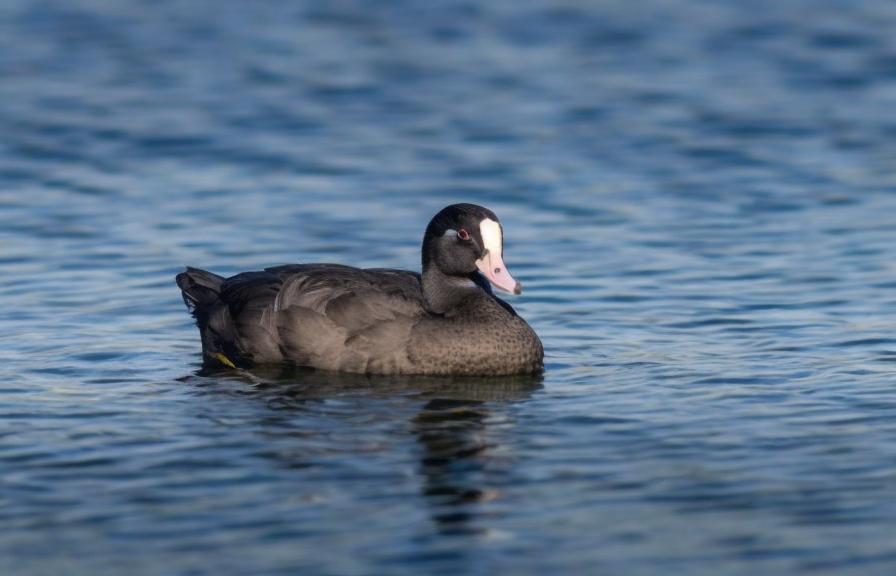
Breeding black ducks can be a rewarding experience for farmers and enthusiasts looking to expand their flock or preserve rare breeds. Black ducks are generally prolific layers, with some breeds laying up to 200 eggs per year under optimal conditions. Providing a suitable nesting area with access to clean bedding materials will encourage broody hens to lay and incubate their eggs.
Incubating black duck eggs can be done using a commercial incubator or by allowing broody hens to hatch the eggs naturally. Proper temperature and humidity levels are essential for successful egg incubation, as well as regular turning of the eggs to ensure proper development. Once hatched, black ducklings should be provided with a warm, dry environment and access to fresh water and starter feed.
Raising black ducklings requires careful attention to their nutritional needs and overall well-being. Providing access to clean water for swimming and foraging is essential for their growth and development. Regular health checks and preventative care will help ensure that black ducklings grow into healthy adults capable of reproducing in the future. By following proper breeding and reproduction practices, farmers and enthusiasts can help preserve rare black duck breeds for future generations.
Conservation of Black Duck Breeds
Conservation efforts aimed at preserving rare black duck breeds are essential for maintaining genetic diversity within domestic duck populations. By promoting responsible breeding practices and raising awareness about the value of these unique birds, conservationists can help ensure that black ducks continue to thrive for generations to come. Supporting organizations dedicated to the preservation of rare duck breeds can also help fund research and education initiatives aimed at protecting these valuable resources.
In addition to breeding programs, habitat conservation is also important for the long-term survival of black duck breeds. Protecting natural wetlands and other important habitats where black ducks thrive is essential for maintaining healthy populations in the wild. By working together to protect both captive and wild populations of black ducks, conservationists can help ensure that these beautiful birds continue to enrich our lives for years to come.
In conclusion, black ducks are a diverse group of birds known for their striking plumage, friendly temperament, and valuable contributions to agriculture. By learning more about the common black duck breeds, their physical characteristics, behavior and temperament, care and maintenance requirements, breeding and reproduction practices, and conservation efforts aimed at preserving these unique birds, we can help ensure that black ducks continue to thrive for generations to come. Whether you are a farmer looking to expand your flock or an enthusiast interested in preserving rare breeds, there is much to appreciate about these beautiful birds.
If you’re interested in learning more about black duck breeds and how to care for them, you might also enjoy reading an article on “Where to Put Your Chicken Coop” on PoultryWizard.com. This informative piece provides valuable insights into the ideal location for your coop, ensuring the health and happiness of your feathered friends. Check it out here for practical tips and advice.
FAQs
What are some common black duck breeds?
Some common black duck breeds include the Cayuga duck, the Black Swedish duck, and the East Indies duck. These breeds are known for their black plumage and are popular for their ornamental and egg-laying qualities.
What are the characteristics of black duck breeds?
Black duck breeds typically have dark black plumage, with some variations in shade and iridescence. They are medium to large in size, with a sturdy build and a calm demeanor. These breeds are known for their hardiness and adaptability to various climates.
What are the uses of black duck breeds?
Black duck breeds are commonly kept for ornamental purposes due to their striking appearance. They are also valued for their egg-laying abilities, with some breeds known to produce a good number of large, white eggs. Additionally, they may be raised for meat, as their dark plumage can make them less visible to predators.
What are some considerations for raising black duck breeds?
When raising black duck breeds, it’s important to provide them with a suitable living environment that includes access to water for swimming and foraging. They also require a balanced diet that includes a mix of commercial feed, greens, and insects. Additionally, proper predator protection and regular health checks are essential for their well-being.
Are black duck breeds suitable for beginners?
Black duck breeds can be suitable for beginners, as they are generally easy to care for and are adaptable to various environments. However, it’s important for beginners to research and understand the specific needs of the breed they choose, as well as to be prepared for the long-term commitment of raising ducks.
Meet Walter, the feathered-friend fanatic of Florida! Nestled in the sunshine state, Walter struts through life with his feathered companions, clucking his way to happiness. With a coop that’s fancier than a five-star hotel, he’s the Don Juan of the chicken world. When he’s not teaching his hens to do the cha-cha, you’ll find him in a heated debate with his prized rooster, Sir Clucks-a-Lot. Walter’s poultry passion is no yolk; he’s the sunny-side-up guy you never knew you needed in your flock of friends!

